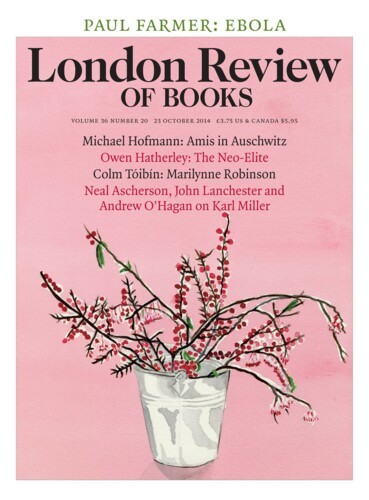for Catherine Lockerbie
Late January, and the oak still green, the year
already wrong. The season miscarried
– the lambs in the field, and the blossom blown –
the whole year broken before it began, and me
standing where winter should have been:
a reived man, a man forspoken.
A woman’s kiss will lift you all morning.
A woman’s curse will grave you to hell.
By the well-spring on the high moor I saw the day
change colour:
watched lightning root in the far woods;
the sky blink.
Fire-shocks, then a scour of rain, a skail-wind
nagging in through the mirk, scuddering,
dishing it down, rain
turning to sleet, to hail, to snow.
And then
the cold
– which had been waiting –
dropped.
The green heath silvered:
every leaf
singled out like rosemary.
The well went milky as a dead eye,
smoked with ice,
though I caught sight of something
as the surface froze –
a clay doll, a corp criadh, busied with pins –
and I started down for home.
Where far below I saw the loch-water
going from grey to white: its long fetch
shaved by draw-knife, scythe and sickle,
into ice, with the whipped spray turning hard in the air
and splintering on the shore.
The next day, the ice so thick
we cut holes in it so the fish could breathe,
and we gathered round to watch them –
the trout rising – crowding tight
up into a gasp of mouths, silver and pink,
these bright sheaves, alive there in the ice.
Then the cold went down too deep,
and the fish were locked, like till, in the glass.
Birds fell stiff from the sky; every lamb died.
The cows that were left gave more blood than milk.
They found young Neil MacLean, the stammerer,
roped to a tree, libbed, with his tongue
shelled out of his head, dressed in red icicles;
Betty Campbell frozen solid in her bath,
forehead scored with the cross. I saw
Macaulay’s mare with the bleed on the brain
going round her field faster and faster till she bolted
straight into the stable wall.
I saw a fox
with a firebrand tied to its tail
going over the high cliff, bundled in flames.
And off to the west, a funeral procession
on the side of a hill where no road lay.
Three months under winter; until winter broke.
They tested the loch with their toes:
the blister of air squeezed
white under the ice, wobbling back
like a spirit levelling.
It took their weight for a while,
till the loch creaked and a mile-long crack appeared
and they couldn’t tell what was ice and what was shore:
watching their footprints soften, sink, dissolve,
their hard and perfect world falling to thaw.
A woman’s kiss will lift you all morning.
A woman’s curse will grave you to hell.
The thing in the well-spring is gone: the clay
worn away to a bed of pins.
I am taken. I am not right; only barely
in the likeness of a man, walking from Loch Iffrin
in a pang of birdsong,
carrying myself
on a hill where no road lies.
Send Letters To:
The Editor
London Review of Books,
28 Little Russell Street
London, WC1A 2HN
letters@lrb.co.uk
Please include name, address, and a telephone number.

